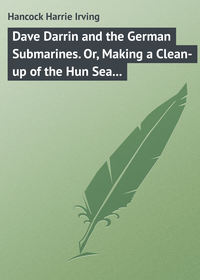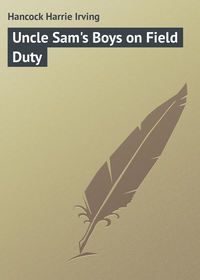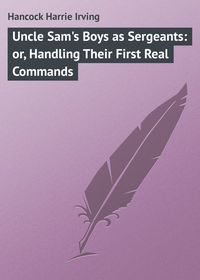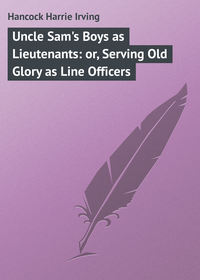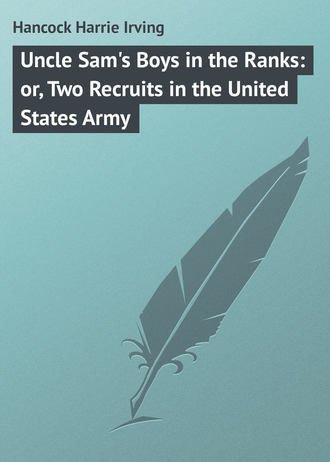 полная версия
полная версияUncle Sam's Boys in the Ranks: or, Two Recruits in the United States Army
"Was any man of B Company absent from his squad room at any time around two o'clock this morning?" called Captain Cortland, looking keenly over his command. Other company commanders were asking the same question. "If so, that man will fall out."
Not a man fell out of any of the four companies.
"Was any man in B Company up and moving about the squad room at or about two o'clock this morning?" was Captain Cortland's next question. "If so, fall out."
Private Hal Overton quickly left his place in the ranks.
"Advance, Private Overton," ordered Captain Cortland.
Hal stepped forward, halting six paces from his company commander and saluting.
"You were up and about in the squad room at that time, Private Overton?"
"Yes, sir."
"Did you leave the squad room?"
"No, sir."
"You are positive of that?"
"Positive, sir."
"You did not leave the squad room, even for a moment?"
"No, sir."
"What brought you out of your bed?"
"I heard shots, sir, and calls for the guard."
"What else did you see or hear, Private Overton?"
"I went to the window, and saw that there was some excitement up by the officers' quarters, sir."
"Then what did you do?"
"After listening and looking for some time, sir, I returned to my bed, wondering what it was all about."
Hal was the only soldier in the battalion who had fallen out of ranks.
"Follow me," ordered Captain Cortland. He led the young soldier back to where Adjutant Wright and the sergeant-major were standing by Major Silsbee.
"Lieutenant Wright," reported Captain Cortland, "Private Overton admits being up in the squad room at the time when the shots were fired in the dark hours this morning. He claims that he did not leave the squad room, and that it was the noise that woke him and made him curious."
"Go to my office, Private Overton, with Sergeant-major Beall," directed the adjutant briefly.
Hal and the sergeant-major saluted, then stepped away.
"Is it allowable, Sergeant, for a rookie to ask what this is all about?" asked Hal respectfully, as the two neared the adjutant's office at headquarters.
"You'd better not ask. I'm not going to tell you anything," replied Beall.
So Hal was silent, though he could hardly escape the feeling that he was being treated a good deal like a suspected criminal. Though he knew that he was innocent of any wrong-doing in connection with the excitement of the night before he could not help feeling undefined dread.
Lieutenant Wright speedily returned to his office, taking his seat at his desk. Hal was summoned and made to stand at attention before the adjutant.
"Now, Private Overton," began the adjutant, fixing a frigid gaze on the rookie, "you may as well tell me all you know about last night's business."
Hal quickly told the little that he knew.
"Come, come, my man," retorted Lieutenant Wright, "that much won't do. Out with the rest of it."
"There isn't any 'rest of it' that I know of, sir," Private Hal answered respectfully.
"Now, my man – "
With that preliminary Lieutenant Wright proceeded to put the young recruit through a severe, grilling cross-examination. But Hal kept his head through it all, insisting that he had told all he knew.
"Overton," rapped in the adjutant, at last, "you are very new to the Army, and you don't appear to realize all the facilities we have for compelling men to speak. If you remain obtuse any longer, it may be necessary for me to order you to the guard-house under confinement."
"I am very sorry, Lieutenant," Hal replied, flushing, "that you will not believe me. On my word of honor as a soldier I have told you all that I know of the matter."
The adjutant bent forward, looking keenly into the rookie's eyes. Hal did not flinch, returning the gaze steadily, respectfully.
Then, in a somewhat less gruff tone, Lieutenant Wright continued:
"That is all for the present, Private Overton. Report to your company commander, at once."
The adjutant and sergeant-major left headquarters a moment later, going by a different path. As Hal glanced down the parade ground he saw the men out of ranks, though every man was still close to his place.
"Major," reported the adjutant, after the exchange of salutes between the officers, "Private Overton denies having left the squad room in the early hours this morning. For that matter, sir, if he had not been honest, he need not have reported that he was out of his bed, or that he heard the sentries' shots."
"It was well he did admit that much," replied the major, "for he let it out at company mess this morning."
"I went at the young recruit, sir, so severely that I was almost ashamed of myself," continued the adjutant. "I am under the impression, sir, that Private Overton told me the truth."
"So am I," admitted Major Silsbee thoughtfully. "His record, so far, is against the idea of his being mixed up in rascally business. I think it likely that Private Overton's extreme fault, if he is guilty of any, is that he is possibly shielding some other soldiers whom he saw sneak back into barracks after the excitement was over. Probably he isn't even guilty of that much."
"Are you going to search the squad rooms, sir?" inquired the adjutant.
"Yes, Wright, though it makes me feel almost sick to put such an affront upon hundreds of innocent and decent men."
"The decent ones, sir, will welcome the search."
"That is what Colonel North told me. Summon the company commanders, and direct them to go into each squad room of their companies with the sergeant in charge of the squad room."
Hal, in the meantime, had returned to B Company. He found many of his comrades regarding him suspiciously, and flushed in consequence. But Corporal Cotter, Private Hyman and others stepped over to him.
"What's it all about, rookie? Do you know?" asked the corporal.
"Not a blessed thing, Corporal," replied the young recruit.
"Look! Here come the company commanders back," called another soldier, in a low tone.
"Sergeant Gray and the other sergeants of B Company will follow me to barracks," called Captain Cortland.
Now the curious soldiers saw each company commander, followed by his sergeants, step back to barracks.
For an hour the puzzled men of the battalion waited on the parade ground.
Then, in some mysterious manner, the news of what had really happened began to spread.
In the night unknown men had broken into Major Silsbee's house. This had not been a difficult thing to do as, on a military post, doors are rarely locked. Not one of the three entrances to Major Silsbee's quarters had been locked at the time.
Downstairs the thieves had gathered a few articles together, but had not taken them, as they had found better plunder upstairs. From a dressing-room adjoining Mrs. Silsbee's sleeping apartment the prowlers had taken a jewel case containing jewels worth some three thousand dollars. There had also been about two hundred dollars in money in the case.
As the thieves were leaving the house they were seen by a sentry some sixty yards away. The sentry had challenged, then fired. The thieves had fled, swiftly, running directly away from all light. But another sentry had also seen them, and had fired. Both sentries had agreed that there were four men, and that they wore the uniforms of soldiers.
The thieves made good their escape. Soon after the alarm was given forty men from A and D companies had been silently turned out to aid in establishing a stronger guard, and the barracks building had been watched through the rest of the night.
Yet no soldier had been caught trying to get back into barracks, nor had any man been missing at roll-call unless well accounted for.
"Somewhere in this battalion, then," murmured Noll to a man in C Company, "there are four soldiers who are thieves."
"Yes," replied the soldier bluntly, "and it looks as though your bunkie at the recruit rendezvous might know something about it."
"Hal Overton doesn't know," flared Noll promptly, "or he'd have told!"
CHAPTER XVIII
THE ANONYMOUS LETTER
IT was a four days' wonder, and then it dropped.
The search at barracks had revealed nothing. There was not a soldier on the post against whom any tangible suspicion pointed.
"There's just one way that a clue might be found," muttered Private Bill Hooper, one morning in Sergeant Hupner's squad room. "In time it may turn out that a sweetheart of some soldier gets some pretty jewelry trinkets given to her."
He glared covertly, though meaningly, at Hal Overton.
But Hal was far enough away neither to see nor to hear Hooper's fling.
"You'll never get caught on that trick, Bill," jeered Private Hyman. "No girl would look at you, even if you displayed the whole of the missing jewelry."
"I've had my share of sweethearts in my day," growled big Private Hooper.
"That was before your face changed for worse," grinned Hyman.
"Don't get gay with me," warned Hooper sulkily, "or your face may suffer some changes!"
"Go over and thump the kid," proposed Hyman.
It was Hal who was meant by the term "kid."
"I don't like that youngster," muttered Hooper. "And I don't trust him, either."
"That'll never worry Hal Overton," smiled Hyman. "Hooper, you look so untidy that it's a wonder Sergeant Hupner doesn't 'call' you oftener for it. And you clean up your rifle about once a fortnight. Look at Overton over there."
Hal was at work with his kit of cleaning tools, going over his rifle as methodically and industriously as though it were a piece of rare silver plate.
"He'll rub and polish that old piece of his until he wears it out," mumbled Hooper.
"One of the surest signs of the good soldier is when you see him putting in a lot of his spare time caring for his uniforms and equipments," broke in Sergeant Hupner, behind them. "Hooper, go and brush your uniform, and clean your boots and polish 'em. I'll report you, if I see you so slouchy in the future."
Bill Hooper moved away, scowling.
Sergeant Gray strode in at that moment.
"Do you want leave to go to town to-day, reporting back at tattoo, Hyman?" inquired the first sergeant.
"Thank you, yes, Sergeant."
"All right; I'll turn you in on the list to Captain Cortland. I'll notify you of leave within half an hour."
Then he stepped over to Hal.
"Overton, you haven't had any leave to visit town since you joined. Would you like to take leave to-day?"
"No, Sergeant, thank you."
Sergeant Gray looked his surprise.
"Why not?" he demanded.
"I have too much to learn right here, Sergeant. I'm going to stick, and work, until I'm out of the recruit class."
"Good boy!" murmured Gray, in an undertone, and passed on. But Gray stopped when he came up with Hupner.
"Hupner, you've got a valuable man in Overton."
"I know it, Sergeant."
"Give him all the little points you can that will take him out of the recruit class promptly."
"Why, Sergeant," smiled Hupner, "Overton can go out of the recruit class at about any time now. Report him for the guard detail any time that you want. He'll make good. He's keen on every bit of his work. He can go through his manual of arms like a juggler. He has studied his infantry drill regulations until he's about worn the book out; he knows his manual of guard duty by heart, and it would be mighty hard to trip him anywhere in his small arms firing manual. Have you noticed his facings and his marching at drill?"
"Yes," nodded Sergeant Gray thoughtfully. "The boy's a good one, all right."
"Take it from me, Sergeant – you needn't hesitate to detail the kid for guard or any other duty. He'll suit Captain Cortland."
"I'll detail him for guard, then, as soon as I can," returned Sergeant Gray. "That gives a young soldier confidence as soon as anything else ever does."
As often as is practicable enlisted men are given a day's leave, with permission to go off post and visit the nearest town. This leave is given to men known to be of good conduct. A "bad" soldier, when one is found, gets little in the way of leave.
Whenever a soldier or an ex-soldier is found slandering the Army service it is invariably safe to set him down as a man who, through very poor soldierly qualities, or actual viciousness, got "in the bad books" of his officers. There is every desire on the part of regimental and company officers to make it pleasant for a truly good soldier, and to keep him in the service until he has reached retiring age.
The man who gets into bad company when away on leave is the soldier who has the most difficulty in getting leave another time.
On the other hand, the soldier of good conduct can have much leave during the month. It is a practice at many posts, when a man has a trade, and can get small jobs to do near the post, to allow him as many half days for that work as may be granted him without injury to the service. In this way handy men or mechanics among the soldiers often add many dollars to their pocket money.
As Private Bill Hooper went away to clean up his uniform and shoes, Hal blithely kept at work putting his rifle in A 1 order.
Both were interrupted, half an hour later, by the bugle call for separate company drill.
Private Overton was among the first on the drill ground. His clothing looked as though it had just come from the tailor's; his rifle had the appearance of being fresh from the arsenal.
"There's a man for you, Hyman," spoke Sergeant Hupner, in an undertone. "If the kid keeps on as he has started he'll be a winner."
"I've had my eye on him," nodded Private Hyman. "He seems to be good all the way through."
"Is he ever a little bit fresh in the squad room?" continued Sergeant Hupner.
"If the kid is," replied Hyman, "I've never happened to be around at that time. But he stands up for himself when he has to. I suppose you've heard, Sergeant, how he trimmed Bill Hooper off?"
"Yes," nodded Hupner; "that sort of thing won't hurt Hooper at all, either."
"Hooper may lay for a chance to accuse Overton of something in the squad room that the kid didn't do."
"I'll have my eyes open for Hooper," replied Hupner dryly. "I haven't anything against any of the other sergeants in this battalion, but I really wish some other sergeant had Hooper in his squad room."
"B Company fall in," sounded the voice of Captain Cortland.
First Lieutenant Hampton and the sergeants hastened to their posts, while the corporals and privates went to their places in the ranks.
The command for open order was given, after which Captain Cortland commanded:
"Inspect the second platoon, Lieutenant Hampton."
With that the company commander himself passed behind the backs of the men of the first platoon, looking each man over keenly.
"Private Hooper, fall out!" ordered Captain Cortland sharply.
When the captain had finished his own work, and Lieutenant Hampton had reported all men in the second platoon to be soldierly in appearance, Captain Cortland turned to Bill Hooper with a look of disapproval.
"Private Hooper, this is the third time within a month that you've failed to report in neat and soldierly appearance. Who is in charge of your squad room?"
"Sergeant Hupner, sir."
"Sergeant Hupner," resumed the captain, "what have you to say to this man's appearance?"
"I ordered him, at least a half an hour ago, sir, to clean himself up."
"Keep right after Private Hooper, Sergeant. If he fails again to keep himself as a soldier should, report him to the first sergeant."
Hooper's face burned darkly. Even honest Sergeant Hupner flushed. A shiftless soldier is a sore trial to the sergeant responsible for him.
Now, at the brisk command, B Company moved off in column of fours. A long practice march followed. While out, the company was halted and drilled searchingly. It was a hard morning's work, B Company returning just in time for dinner. In the afternoon there was another drill. Parade wound up the day.
On his return from parade Lieutenant Wright, the adjutant, found in his office mail a letter that caused him a good deal of astonishment.
"Watch Private Overton, B. Company, if you want to find a man who knows a lot about the robbery the other night. He has been acting suspiciously, and I have it from a man in his squad room that Overton sometimes talks in his sleep in a way to show that either he was one of the robbers, or else that he knows who they are.
"A Friend."CHAPTER XIX
A SECRET COWARD
IF any official notice was taken of that lying anonymous note the rascally writer thereof did not have the satisfaction of discovering it for some time to come.
Duties in the battalion went on, as usual, at Fort Clowdry, the next day.
Late in the afternoon, however, came a brief battalion drill, followed by the glorious spectacle of dress parade.
After the regimental band had played the colors down the line, and the other ceremonies had been observed, Adjutant Wright took his post to publish the orders.
These were few, and the reading did not occupy long. As the officer returned the papers to the breast of his coat the men expected to see him step back. Instead, however, the adjutant sharply called:
"Battalion, attention! I am directed by the battalion commander to make an inquiry. Each man will pay close heed, and answer if he is able. Has any non-commissioned officer or private in this battalion heard, at any time lately, any man in the same squad room with him talk in his sleep in such a way as to indicate that the man talking in his sleep had any knowledge concerning the men who recently broke into and robbed the battalion commander's quarters? Any man having such knowledge will fall out."
There was a tense silence, but the ranks of the first battalion remained intact.
"If there is any non-commissioned officer or private who did not fully understand my question, he will fall out," continued the adjutant.
Still no man fell out.
"If the man who addressed the anonymous letter to the battalion adjutant is present he will step out," continued Lieutenant Wright.
Still the ranks remained unbroken.
Being at "attention," each man in the four companies was looking fixedly ahead. But curiosity was running wild under all those blue fatigue blouses!
"An anonymous letter has been received at battalion headquarters," continued the adjutant sternly. "This letter accuses a soldier, who is named, of having guilty knowledge concerning the perpetrators of the robbery of the other night. The writer of this letter asserts that other men in the squad room have heard the anonymously accused soldier talking in his sleep in such a manner as to implicate the accused in the robbery.
"No man present has acknowledged having heard such talk. Either some soldiers now in ranks have lied in denying having heard such talk, or else the writer of the anonymous letter is a liar. I am directed by the battalion commander to state his belief that the writer of the anonymous letter is the liar.
"The writer of the letter has been ordered to fall out and reveal himself. If that writer is present, then he knows in his own mind, and one of these days his comrades will know, that he is too much of a coward to face responsibility for his sneaking action.
"The man who writes an anonymous letter is always a coward, a sneak, and usually a liar, too. I am directed by the battalion commander to state that, if the writer of this anonymous letter can be found, he will be placed on trial for his act, which is one unworthy of a soldier.
"I am further directed by the battalion commander to state that no letter anonymously accusing an enlisted man will react in any way against the accused. The battalion commander feels that he cannot state, too strongly, his intense contempt for any coward who will resort to slandering a comrade in an anonymous letter.
"The battalion commander will be glad, at any time, to receive from any man in his command any information or report that may be made honestly and for the good of the service. But the man making such report will go to headquarters and make it in person, or else will put his information in writing and sign it fully and manfully."
After an impressive pause Adjutant Wright stepped back, saluted his commanding officer, then stepped to his proper position.
At a signal from the adjutant the buglers now sounded retreat. As the last notes died out the sunset gun was fired. Rifles flew to "present arms," swords flashed to salute and male civilian onlookers uncovered their heads while the band crashed out with "The Star Spangled Banner."
As the band played, the Flag fluttered down from the peak of the post flag staff and descended into the hands of its defenders. One man stood in the ranks at that moment who was unfit to touch even the border of that national emblem.
"Order arms!" rang out, as the last note died out. "Right shoulder arms!"
Then by column of fours the battalion marched briskly off the field, to be halted and dismissed near barracks.
No sooner were the men in their quarters than the same angry inquiry rose in each squad room:
"Who has been writing lying letters about a comrade?"
No one admitted being the dastard, of course, yet over at headquarters Major Silsbee, at that very moment, was asking:
"What makes you so very sure, Wright, that some man in this command wrote the anonymous letter?"
"It is all very simple, sir," replied the adjutant. "Look at the note again, sir, and you'll see that it is typewritten – "
"Of course, Wright; I've known that from the first."
"But, sir, it's written in the style of type that is used on the Everite typewriter. This post is equipped with Everite typewriters; we have them here at headquarters, and every first sergeant has one, too, for his clerk."
"And there may be a dozen more Everite typewriters over in Clowdry," suggested Major Silsbee dubiously.
"No, Major; I've made an investigation. I have a list of every firm or person in Clowdry who owns a machine – only about a dozen in all, and not one of them is an Everite. Major, the letter was written on this post, and with an Everite machine."
"Then, by the great guns, sir, I hope you go further and catch the culprit," exploded Major Silsbee, bringing his fist down on the desk.
"Ah," sighed Lieutenant Wright. "That's just where the trouble is. It will be a hard task, sir."
CHAPTER XX
THE LUCK OF THE YOUNG RECRUIT
ON top of all this came the news that Colonel North's quarters had been entered the night following.
Worse, the scoundrels had used chloroform this time. Colonel North awoke at about three in the morning, his head feeling heavy and dull. He noted at once the strange odor in the room. Then he roused his family. Traces of thieves were found; within ten seconds after that Colonel North had summoned the guard.
Yet the two sentries on duty in officers' row both declared that they had seen no prowlers.
Almost every article of value had been found and taken. A pair of costly revolvers belonging to the regimental commander had gone with the loot. Some money, too, had been found and taken. Colonel North and his family placed their loss at nearly four thousand dollars.
"Lieutenant Ray," said Colonel North, to the officer of the day, who had followed the guard, "I think you had better summon Major Silsbee at once."
The major was there, inside of five minutes.
"So the scoundrels have blistered you, too, sir?" demanded the white-faced battalion commander wrathfully.
"They have taken almost everything in the way of valuable property that Mrs. North and I own, Major."
"We've got to put a stop to this, sir. And we've got to find and bring the rascals to boot."
"Pardon me, Colonel; shall I pass the order for a prompt search of barracks?" queried the officer of the day.
"No, Mr. Ray," replied Colonel North promptly. "Until I have real proof I'm not going to put the slight upon our enlisted men. I believe they're all fine men. If I had taken more time to think I never would have sanctioned the last search of barracks. It shan't happen again."
Captain Ruggles of A Company, having heard some excitement along the row, now came in.
"What we might, and perhaps ought to do, Major," continued the Colonel, "is to advise the married officers whose homes have not yet been robbed that they will do well to send their valuables into town for safe-keeping at the bank for the present."


